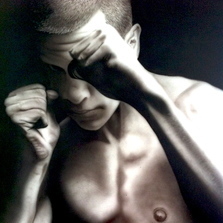This poem starts with such great rhythm. The first four lines are all two-beat lines, describing the death of a relationship. The funneling into one beat with "Yes" provides great impact. The poem goes on with the same rhythm and the same sentiment, sealing what seems to be an inexorable end: "Eternal turns infernal. / Disbelief confronts relief."
But a wonderful turn comes with the next line: "You are so beautiful" It succeeds because it's so disarming, it's something that even the bitterness of "infernal" and "disbelief" can't quench. And the long 'o' sounds ("so" and "beautiful") have echoes from before -- eternal, infernal. The next line is another one-beater, "I wish," and the wish is so modest after the Dickinsonian stretches to the "forever" and "eternal": "I wish / We shared a home."
But where can this "imagined" wish go? It goes to the "muse" -- the inability of the speaker to drop the thoughts of "you" lead him seek recourse in the muse. But another wonderful turn happens here, in the characterization of the "muse" -- she is "a curse for now," and a "sound that pounds." I think this poet has great governance in the introduction of the suddenly erotic -- it's great. The final two lines wrap it up with an enjambment and caesura: "The second beat of two / Missing, my life thru." It's as though this poem has framed an entire life -- loss and love, beauty, eroticism -- and now it's "thru."



















